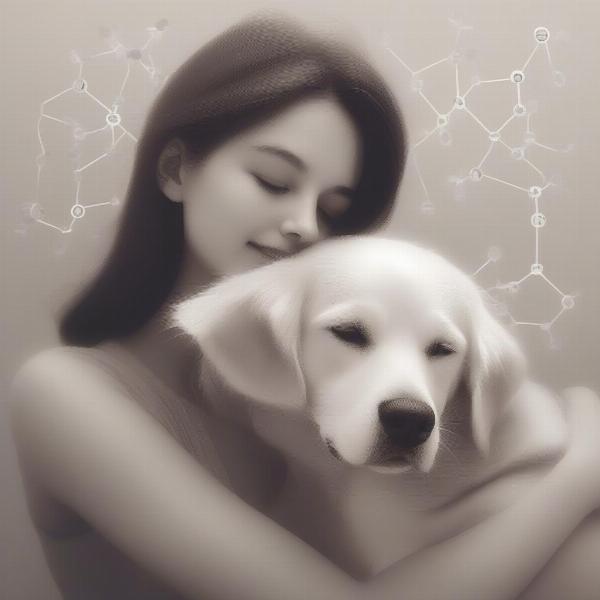The phrase “I love my dog so much it hurts” perfectly encapsulates the intense emotional connection many of us share with our canine companions. It’s more than just affection; it’s a deep, abiding love that enriches our lives in countless ways. This article delves into the science behind this powerful bond, exploring the reasons why we love our dogs so intensely and offering practical advice on nurturing this special relationship.
It’s a feeling many dog owners understand: a love so profound it can bring tears to your eyes. But what is it about these furry creatures that elicits such powerful emotions? The answer lies in a complex interplay of evolutionary history, hormonal responses, and the unique social dynamics that develop between humans and dogs.
The Science of Canine Companionship
Our relationship with dogs dates back thousands of years, to a time when wolves began to associate with humans, likely drawn by the availability of food. This co-evolution has shaped both species, leading to a deep understanding and mutual benefit. When we interact with our dogs, our brains release oxytocin, often referred to as the “love hormone.” This same hormone is released during bonding experiences with human loved ones, reinforcing the feeling of connection and attachment.
 Dog and Human Bond: The Role of Oxytocin
Dog and Human Bond: The Role of Oxytocin
Dogs, too, experience a surge in oxytocin when interacting with their human companions. Studies have shown that dogs prefer the scent of their owners to that of unfamiliar humans, further demonstrating the strength of their attachment. This reciprocal affection creates a positive feedback loop, strengthening the bond over time.
Nurturing the Bond: Showing Your Dog You Care
While the biological basis for our love is fascinating, expressing that love in tangible ways is equally important. Providing for your dog’s basic needs is the foundation of a strong relationship. This includes a balanced diet, regular exercise, a safe and comfortable environment, and consistent veterinary care.
Beyond the essentials, there are countless ways to enrich your dog’s life and deepen your connection. Engaging in activities your dog enjoys, whether it’s a game of fetch, a leisurely walk, or simply cuddling on the couch, strengthens the bond and creates shared positive experiences. Training, too, is a crucial aspect of a healthy relationship. It provides mental stimulation, establishes clear communication, and builds mutual respect.
When Love Becomes Overwhelming: Managing Separation Anxiety
The intense love for our dogs can sometimes manifest as separation anxiety, a condition where dogs experience distress when left alone. Signs of separation anxiety can range from mild whining to destructive behavior. If your love for your dog is coupled with concern about their well-being when you’re apart, addressing separation anxiety is vital.
Creating a positive association with your departure, establishing a consistent routine, and providing enrichment activities can help alleviate separation anxiety. Consult with a veterinarian or a certified dog trainer for personalized guidance.
Conclusion: Cherishing the Unconditional Love of a Dog
The phrase “I love my dog so much it hurts” reflects the profound impact dogs have on our lives. Understanding the science behind this bond and actively nurturing it through care, attention, and training allows us to fully appreciate the unconditional love and companionship our dogs offer. This deep connection enhances our well-being, bringing joy, purpose, and a unique sense of fulfillment to our lives.
FAQ:
- Why do I cry when I think about how much I love my dog? The intense emotional bond with your dog triggers the release of oxytocin, a hormone associated with love and bonding, which can evoke strong emotional responses, including tears.
- How can I show my dog I love them? Providing for their basic needs, engaging in activities they enjoy, training them consistently, and spending quality time together are all ways to express your love.
- Is it normal to feel like my dog is my child? Many dog owners feel a deep parental connection with their dogs. This is a natural extension of the strong bond we develop with them.
- What should I do if my dog has separation anxiety? Consult with a veterinarian or certified dog trainer for guidance on managing separation anxiety. They can recommend strategies tailored to your dog’s specific needs.
- How can I strengthen my bond with my dog? Engaging in activities your dog enjoys, training together, and spending quality time cuddling or playing can all strengthen your bond.
About ILM Dog
ILM Dog is your trusted international source for expert advice on all aspects of dog care and companionship. From breed selection and puppy care to senior dog health and training tips, we provide reliable, practical information to help you nurture a strong and loving bond with your canine companion. We offer guidance on a wide range of topics, including Dog Breeds and Selection, Health and Medical Care, Training and Behavior, Nutrition and Feeding, Grooming and Hygiene, and Products and Accessories. For personalized advice and support, contact us at [email protected] or call us at +44 20-3965-8624. Visit ILM Dog today!